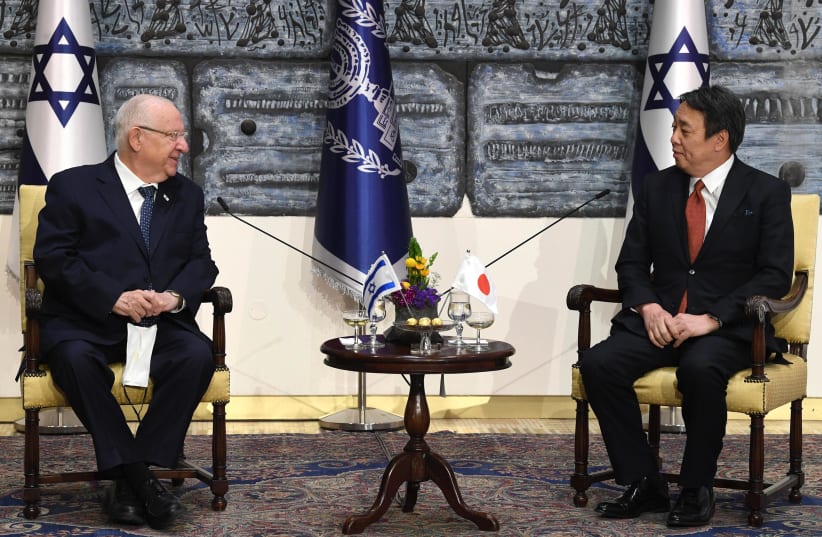As a rule, President Reuven Rivlin receives the credentials of five or six new ambassadors on any given morning, but on Wednesday he received the credentials of only two because, according to Gil Haskel, chief of state protocol, they were the only new ambassadors.
There are other diplomats who are heads of mission, but have not yet attained the rank of ambassador, and therefore do not present ambassadorial credentials.
Cai Run of China and Koichi Mizushima of Japan represent countries that are very important to Israel in terms of trade and investment; and if coincidence serves as a guideline, Israel is also very important to them.
At approximately the same time as the Chinese ambassador was presenting his credentials, his Foreign Minister Wang Yi launched an initiative for achieving security and stability in the Middle East.
Wang visited several Middle Eastern countries last month – but not Israel.
In a statement published on the website of the Embassy of the People’s Republic of China, Wang stated that the complex and highly contentious issues of the Middle East have a bearing on global security and stability, and therefore all stakeholders in the international community ought to play a positive role for that security and stability.
Toward this goal, China advocates mutual respect. Wang explained that the Middle East is home to unique civilizations with unique social and political systems. While respecting these and supporting Middle East countries in exploring their own paths of development, he continued, it is important “to change the traditional mindset and see Middle East countries as partners for cooperation, development and peace, instead of simply perceiving the Middle East through the lens of geo-competition.”
Wang also emphasized the importance of upholding equity and justice, declaring: “Nothing represents equity and justice in the Middle East more than a sound solution to the question of Palestine and earnest implementation of the two-state solution. We support active mediation by the international community toward this objective and holding an authoritative international meeting on this matter when conditions are ripe.”
In its presidency of the UN Security Council this May, Wang said that China will encourage the council to fully deliberate on the question of Palestine to reaffirm the two-state solution, and that Beijing will continue to invite peace advocates from Palestine and Israel to China for dialogue, and will also welcome Palestinian and Israeli representatives for direct negotiations.
In welcoming Cai, Rivlin spoke of the Iranian threat to annihilate Israel, saying that no member state of the United Nations has the right to threaten another member state. He also underscored the dangers of Iran’s nuclear enrichment program.
Rivlin, who has been to China three times, noted that next year will mark the 30th anniversary of the establishment of diplomatic relations between Israel and China, two ancient nations whose history goes back thousands of years.
Rivlin emphasized the appreciation of the Jewish people for China’s having provided a safe haven in Shanghai for Jews fleeing the Nazi tyranny. “We will never forget,” he said.
Despite their long histories, the 30-year diplomatic relationship between Jerusalem and Beijing is nonetheless a long time, Rivlin said, reflecting on the miraculous progress made in many fields by both countries in that period.
He also spoke of the ever-growing bilateral cooperation, noting that this will be enhanced even further once direct flights between Israel and China will be resumed. Such a development would be beneficial not only to businesspeople, he said, but for many Israelis who want to visit China as tourists.
Mindful of the demographic imbalance between the two countries, Rivlin said: “Together, we can do a lot for the whole world.”
Cai affirmed that bilateral relations can soar to greater heights.
“The establishment of bilateral relations opened a new chapter in the histories of our two countries and our two peoples – and those relationships are still intensifying,” he said.
He cited the impressive increase in bilateral trade between China and Israel in 2020, which despite the coronavirus crisis, came to $17.5 billion, showing an 18.8% increase over the previous year. The anticipated rise for 2021 is 20%, he said.
Prior to being posted to Israel, Cai spent five years as ambassador to Portugal.
Israel and Japan entered into relations in May 1952, but it was not until 1963 that the relationship was upgraded to the ambassadorial level.
Israel was one of the first countries with which Japan established diplomatic relations after the Second World War, said Mizushima, for whom Israel is his first ambassadorial posting after a series of high-level positions within the Japanese Foreign Ministry and abroad, the most recent of which was director-general of Japan’s Bureau for Consular Affairs.
Rivlin, who visited Japan in his capacity as communications minister, spoke of how greatly impressed he had been by Japanese culture, efficiency and discipline.
In more recent times, he was and is impressed by what Japan has done and is doing to foster Middle East peace and cooperation, especially among the Palestinians and Jordan through the manifold projects that it has initiated in those areas, and which in themselves lead to further cooperation.
In a reference to Japan’s technological accomplishments, Rivlin said: “We are doing so much together – and we can do so much more.”
Mizushima conveyed a message from Emperor Naruhito.
